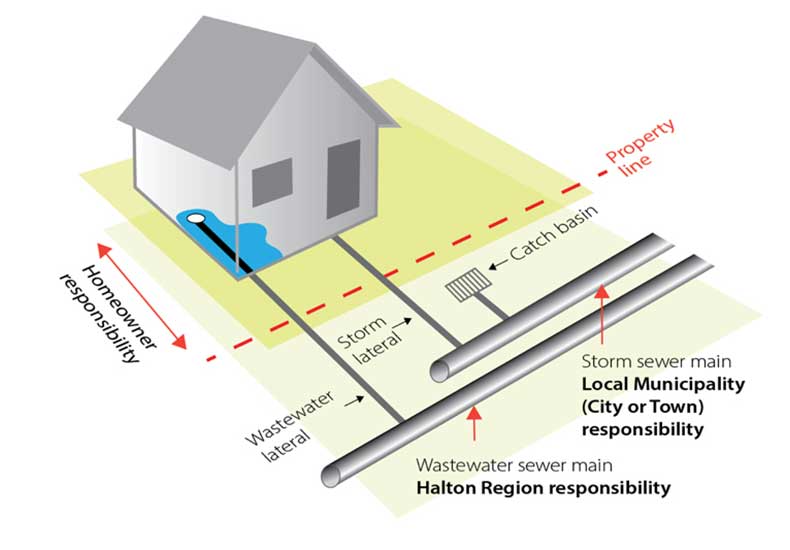Flooding can happen anywhere and anytime, especially during heavy thunderstorms. Taking the right steps can make all the difference to limit the effects.
Flood preparedness and response are shared responsibility. Flooding can cause damage to your home, your belongings or cause sewer back-ups when the storm or sanitary sewers become too full. Residents can to do their part by being prepared and knowing who to contact for flooding-related issues.
The Town of Oakville and the Region of Halton work together to respond to concerns and ensure that your home and property are properly protected during a storm.
Know who to contact
Town of Oakville
905-845-6601
service@oakville.ca
- Catch basin, ditch or culvert flooding
- Stormwater management ponds
- Creek blockage
- Road or sidewalk water pooling
- Property flooding due to neighbouring construction
- Park, trail, or town facility drainage concerns
- Harbours
Halton Region
311 or 905-825-6000
accesshalton@halton.ca
- Basement flooding
- Enhanced basement flooding program
- Waste-water flooding
- Watermain courses
- Fire hydrants

Types of flooding
Homeowners who have in-house flooding in their home should take action quickly and safely.
If you are in immediate danger, call 911.
If your basement is flooded
- Take immediate health and safety precautions. Visit the Halton Region website for information about how to prevent illness and injury.
- Call Halton Region at 3-1-1. You can also reach the Halton Region contact centre at 905-825-6000, or toll-free at 1-866-442-5866, TTY: 905-827-9833
- Contact your insurance provider for your claims process. Note: The town does not provide advice to private homeowners about insurance policies. If you do not have home or contents insurance, contact your preferred insurance company or broker to obtain an insurance policy.
Visit Halton Region website for more information on what to do if your basement has flooded.
Homeowners who have property flooding should take action quickly and safely.
If you are in immediate danger call 911.
If your property is flooded
- Take immediate health and safety precautions.
- Contact your insurance provider for your claims process. Note: The town does not provide advice to private homeowners about insurance policies. If you do not have home or contents insurance, contact your preferred insurance company or broker to obtain an insurance policy.
Driveways and culverts
If you have ditches and culverts along your driveway, maintaining them is your responsibility. Keep them free of obstruction as they are the channel to carry excess water during rainfall. To learn more visit the Ditches and Culverts page.
If you are widening your driveway, or applying for a curb cutting or culvert replacement, make sure you apply to the town for necessary permits. Compromised culverts and ditches along your driveway can flood easily.
Flooding from neighbours property
Sometimes flooding is caused by poor grading of a property, a sump pump has stopped working, a leaking pipe, a drain pipe pointed to an inappropriate area, blocked swale, or plugged weepers around a house. It is the homeowner’s responsibility to maintain their property and to ensure it does not impact neighbouring properties. Reach out to your neighbour if you notice flooding on their property.
Issues often arise that have a negative impact on neighbour relations but no by-law has been broken.
In cases where mediation may assist in resolving the issue, visit the Community Conflict Resolution Services of Halton (CCRS Halton) website or phone 905-844-5414 for information on how to resolve conflict. Phone Halton Regional Police Service at 905-825-4777 if the issue becomes heated or you are experiencing harassment from neighbour(s).
To learn more, visit the Property & Grading page.
Stormwater network flooding happens if the amount of rainfall or melting snow is too much for drainage systems to handle. If this happens, storm sewers can backup, roadways and parks fill with water and water may seep in through windows, building walls and floors.
If you are in immediate danger call 911.
If you see roadway, sidewalk, park, pond, private property or ditch flooding:
- Take immediate health and safety precautions.
- Contact ServiceOakville at 905-845-6601 to report the concern
Learn more about how the town is dealing with stormwater management
Creeks can flood when rain or melting snow causes the creek water levels to rise and spill over its banks into areas next to it.
The areas next to the creeks that can be underwater for a period of time are called floodplains. If water is lying in these areas, the floodplain is doing it's job and there's no cause for concern.
If the creek is blocked by a tree or ice jam, please contact ServiceOakville at 905-845-6601. Please note that some creeks may be privately owned and are the responsibility of the property owner.
To review creeks in Oakville, please refer to Conservation Halton map.
If you are in immediate danger, please call 9-1-1.
Lake Ontario collects water from precipitation, runoff from the surrounding basin, and water from the Niagara River. Lake Ontario flooding happens when high water levels from these water sources making the lake overflow along the shoreline.
If you are in immediate danger call 911.
If you see flooding happening on Lake Ontario:
- Take immediate health and safety precautions.
- Contact ServiceOakville at 905-845-6601
Learn more about shoreline protection
Visit the Shoreline page.
